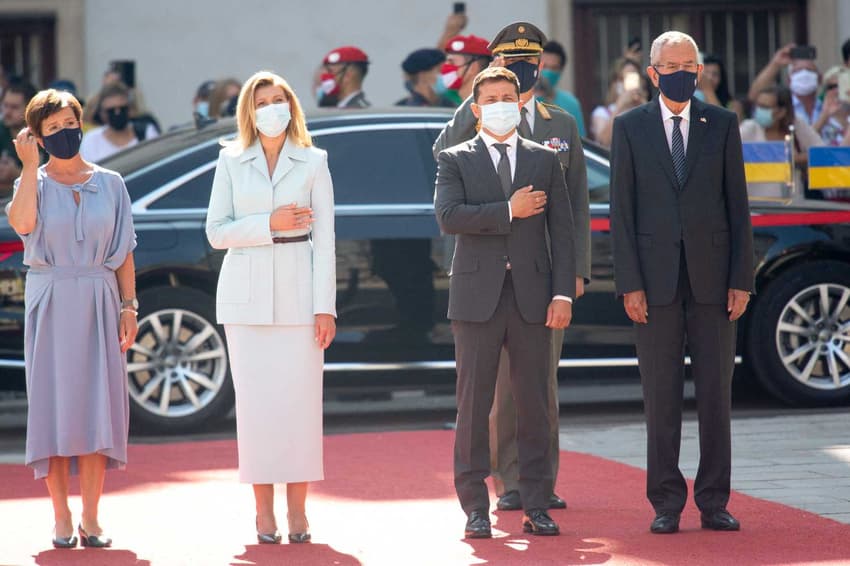EXPLAINED: What would 'Austrian-style neutrality' mean for Ukraine?

Russia has demanded Ukraine adopt 'Austrian-style neutrality'. But what does that mean?
The Kremlin on Wednesday called for Kyiv to adopt a status similar to Sweden and Austria, describing it as a "compromise" option as the two countries grind through conflict talks nearly three weeks into Russia's invasion of Ukraine.
Nehammer on Russian sanctions: ‘Austria is and will remain neutral’
But Kyiv quickly rejected the proposal, saying talks with Moscow to end fighting should focus on "security guarantees".
But what exactly would 'Austrian neutrality' look like in Ukraine?
In Austria, the policy of neutrality was imposed by the then Soviet Union as a price for the end of the Allies' post-war occupation of the country in 1955.
"Neutrality is part of the country's identity," says Martin Senn, political scientist at Innsbruck university.
The policy offered the country an honourable way of exiting the rubble of World War II and avoiding the blame for complicity in the Nazi regime.
Ukraine conflict: Would NATO protect non-member Austria?
It then made use of its status to host high-profile international organisations and summits including between then US president John F Kennedy and Soviet leader Nikita Krushchev in 1961, and their successors Jimmy Carter and Leonid Brezhnev in 1979.
However, since the end of the Cold War, Austria has taken several steps towards the Western camp. It joined the European Union in 1995 and participated in the joint security and defence policy outlined in the 2009 Lisbon treaty.
Austria has said its neutrality does not prevent it from condemning breaches of international law and has condemned the invasion of Ukraine.
EXPLAINED: Why isn’t Austria in NATO?
But according to Senn, there has never been "a true discussion on the issue of neutrality", which is now "urgently needed".
Military figures have also spoken out in favour of more defence spending, a stance backed by the public in a recent survey.
In the EU, only Ireland and Malta spend a lower share of their GDP on defence than in Austria, where the figure stands at 0.7 percent.
EXPLAINED: Why Switzerland’s neutrality has always been ‘malleable’
Austria's government -- headed by ex-soldier Karl Nehammer -- has said it wants to boost this to one percent to match neighbouring Switzerland.
Despite this, Nehammer has ruled out any change to the country's officially neutral status.
Looking at the opinion polls, it's not hard to see why -- despite the war, four out of five Austrians are still opposed to the idea of joining NATO.
Comments (1)
See Also
The Kremlin on Wednesday called for Kyiv to adopt a status similar to Sweden and Austria, describing it as a "compromise" option as the two countries grind through conflict talks nearly three weeks into Russia's invasion of Ukraine.
Nehammer on Russian sanctions: ‘Austria is and will remain neutral’
But Kyiv quickly rejected the proposal, saying talks with Moscow to end fighting should focus on "security guarantees".
But what exactly would 'Austrian neutrality' look like in Ukraine?
In Austria, the policy of neutrality was imposed by the then Soviet Union as a price for the end of the Allies' post-war occupation of the country in 1955.
"Neutrality is part of the country's identity," says Martin Senn, political scientist at Innsbruck university.
The policy offered the country an honourable way of exiting the rubble of World War II and avoiding the blame for complicity in the Nazi regime.
Ukraine conflict: Would NATO protect non-member Austria?
It then made use of its status to host high-profile international organisations and summits including between then US president John F Kennedy and Soviet leader Nikita Krushchev in 1961, and their successors Jimmy Carter and Leonid Brezhnev in 1979.
However, since the end of the Cold War, Austria has taken several steps towards the Western camp. It joined the European Union in 1995 and participated in the joint security and defence policy outlined in the 2009 Lisbon treaty.
Austria has said its neutrality does not prevent it from condemning breaches of international law and has condemned the invasion of Ukraine.
EXPLAINED: Why isn’t Austria in NATO?
But according to Senn, there has never been "a true discussion on the issue of neutrality", which is now "urgently needed".
Military figures have also spoken out in favour of more defence spending, a stance backed by the public in a recent survey.
In the EU, only Ireland and Malta spend a lower share of their GDP on defence than in Austria, where the figure stands at 0.7 percent.
EXPLAINED: Why Switzerland’s neutrality has always been ‘malleable’
Austria's government -- headed by ex-soldier Karl Nehammer -- has said it wants to boost this to one percent to match neighbouring Switzerland.
Despite this, Nehammer has ruled out any change to the country's officially neutral status.
Looking at the opinion polls, it's not hard to see why -- despite the war, four out of five Austrians are still opposed to the idea of joining NATO.
Join the conversation in our comments section below. Share your own views and experience and if you have a question or suggestion for our journalists then email us at [email protected].
Please keep comments civil, constructive and on topic – and make sure to read our terms of use before getting involved.
Please log in here to leave a comment.